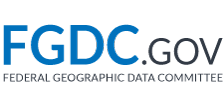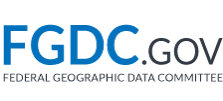Action items.
Action: Rick Pearsall was invited by Mark Reichardt (OGC) to give a National Map presentation at the April 8th I-Team Technological Advisory Committee meeting.
Action: Please contact David Painter (dpainter@fgdc.gov) if you would like to participate as a CAP proposal reviewer.
Action: The coordination group had general agreement on creating a permanent FGDC Homeland Security Working Group to deal with CIP issues.
Action: Susan Kalweit, Shel Sutton, and Mike Domaratz will work together to create a draft charter for the proposed Homeland Security Working Group. This charter will be submitted to the Ad Hoc Homeland Security Working Group for review and then will go to the Coordination Group for approval in April or May.
Action: Susan Kalweit will forward Alison the minutes from the March 7-8 Dalgren CIP meetings to be forwarded to the Coordination Group members.
Action: A meeting with the Agency principle contacts will be held in the Main Interior Building on Thursday, March 14 from 1-4 pm. More detailed project and budget plans will be developed at this meeting.
Action: John Moeller will send the minutes from the March 5 Mark Forman meeting to the Agency principle contacts for review.
Host: Betsy Banas, USFS
John Moeller, FGDC
Alison Kiernan, FGDC
Susan Kalweit, NIMA
Charles Roswell, NIMA
Shel Sutton, MITRE/NIMA
Rick Yorczyk, NOAA FGCS
Ivan DeLoatch, EPA
Susan DeLost, USDA FS
Chris Clarke, USDA NRCS
Shirley Hall, USDA FSA
Nancy Blyler, USACE
David Morehouse, DOE
Paul Rooney, FEMA
Mark Reichardt, OGC
Carol Brandt, DOT BTS
Myra Bambacus, NASA
Hedy Rossmeissl, USGS
Rick Pearsall, USGS
Jan Simmons, USGS
David Painter, FGDC
Leslie Wollack, NSGIC
Molly Singer, ICMA
Kurt Buehler, OGC
Steven Johnson, Booze Allen Hamilton
Michelle Torreano, EPA
Scott McAfee, FEMA
Mario Lopez-Gomez, DOJ/Civil Rights Div.
Bruce Ambacher, NARA
Susan Hargrove, DOE
National Map Update - Rick Pearsall, USGS
The National Map - An Update (2.5 mb PPT)
The National Map will help meet the Nation's needs for base cartographic data and maps. The National Map relies heavily on partnerships to provide data. When the National Map document recently went through public review there were requests for more detail on the business model, partnerships, it's relationship to the NSDI and other geospatial and legislative initiatives, and the review of the public domain archive.
A Mapping Science Committee review will be undertaken in early fall to review the goals and benefits of the National Map, as well as the role of USGS as leader.
The National Map point of contact is Michael Domaratz (mdomarat@usgs.gov). The National Map website is: http://nationalmap.usgs.gov/.
The FY 2002 National Map pilot projects are: Washington-Idaho, Lake Tahoe Area, Utah, Pennsylvania, Missouri, Boston, Delaware, Florida, Texas, and a U.S. intermediate resolution project. The pilot projects investigate technical issues to provide nationally consistent, scalable, transaction-based data. The pilot projects also investigate technical issues including data licensing, public domain, and the shared roles and responsibilities of partnerships.
An example of a pilot project is available at www.tnris.state.tx.us/stratmap/ (this is the Texas pilot project entitled StratMap.) A process is being built to allow the handoff from USGS to Texas when the person using the site requires more detailed data.
Discussion:
The National Map, GeoSpatial One Stop and the I-Teams are symbiotic. It would be helpful to create a ven diagram that details the relationships between the different geospatial programs and initiatives. The relationships between NSDI, Geo 1 Stop, the I-Teams and data providers need to be clarified.
Action: Rick Pearsall was invited by Mark Reichardt (OGC) to give a National Map presentation at the April 8th I-Team Technological Advisory Committee meeting.
FY 2002 Cap Proposals Review - David Painter, FGDC
Volunteers are needed to review the FY 2002 CAP proposals. The CAP program is very useful in reaching the grass organizations on issues like data documentation and web mapping. Out of about 60 proposals, approximately 27 projects will be chosen by the reviewers and then submitted to the FGDC in May for approval. The 2002 CAP information is available at: http://www.fgdc.gov/funding/capfact2002.pdf.
Action: Please contact David Painter (dpainter@fgdc.gov) if you would like to participate as a CAP proposal reviewer.
Homeland Security Working Group - Susan Kalweit, NIMA
The purpose of the presentation was to gain concurrence of the Coordination Group to focus the Homeland Security Working Group on Critical Infrastructure Protection (CIP) data standards. NIMA and USGS are the proposed co-chairs of the working group and the proposed focus of the group would be the identification of metadata, symbology, interface specifications and standards for the geospatial information technology required for CIP. CIP is a key component of the Homeland Security mission. The mission of this working group would be complimentary with the Geospatial One Stop activities.
NIMA is the DOD lead for geospatial metadata and symbology standards for homeland security. NIMA is seeking the position of Lead Federal Agency (LFA) for the CIP thematic layer under OMB Circular A-16.
Concept: Cross-reference NSDI Framework and NIMA Critical Infrastructure thematic elements and identify sources of population of CIP thematic elements.
Recommended actions: Hold regional workshops for subgroups to meet with State and local authorities to determine CIP needs and sources not visible at the Federal level, as well as information processing capabilities not visible at the Federal level.
Results: Provide first responder community with an information technology base; provide States with information and tools to use in the case of a CBRN (chemical, biological, radiological or nuclear) event; provide support for analyses of border data; coordinate information sources and common tools; and ensure that military operations can succeed.
Data access, sharing and privacy issues will be addressed by this working group. Some of their meetings will require clearance.
Action: The coordination group had general agreement on creating a permanent FGDC Homeland Security Working Group to deal with CIP issues.
Action: Susan Kalweit, Shel Sutton, and Mike Domaratz will work together to create a draft charter for the proposed Homeland Security Working Group. This charter will be submitted to the Ad Hoc Homeland Security Working Group for review and then will go to the Coordination Group for approval in April or May.
Action: Susan Kalweit will forward Alison Kiernan the minutes from the March 7-8 Dalgren CIP meetings to be forwarded to the Coordination Group members.
Go to: http://www.wamu.org/dr/index.html to hear the March 5 Diane Rhem show on freedom of information: A discussion about the decreased availability of government information since the terrorist attacks of Sept. 11, the re-evaluation of the Freedom of Information Act (FOIA), and how restrictions on information disclosure affect the press and the public.
Geospatial One Stop Meeting Review - John Moeller, FGDC
We need to determine what is in the Geo One Stop for States and locals.
- State GIS coordinators think that the Geo One Stop will help them coordinate their efforts with Federal GIS efforts.
- The goal of the Geo One Stop is to deal with data at the local level as well as at the broad National level.
- Locals tend to need data from neighboring jurisdictions that they don't want to pay for. So Federal data, at little to no cost, looks good to them.
- FEMA has been using and posting good local level flood data. This makes the communities happy that their information is being used.
- State and local governments get upset if Feds take their data and give them nothing in return.
- ICMA recommends working through ICMA to get the word out to local governments (they will then distribute the information downwards).
- We need to deal with the issue of funding support for State and local participation (reasonable travel and per diem costs for standards development teams).
Data models will be the same for all of the 7 data sets.
We need to focus on where we go now. We need to reconcile the changes made to the high level original slides at the March 5 Geo One Stop meeting with Mark Forman. We need to refocus on high-level goals (there is a need for more detail).
We need to have 2 sets of slides detailing the initiative. One should be at a high level.
We need more visibility at a higher level - we should coordinate with a high level advisory group (experts from the CIO and GIO community).
Planned acquisition inventory has lots of potential benefits for leveraging data collection investments.
Next Steps:
- We need to push forward Develop a proposal for standards development activities and get it into the ANSI process
- Prepare more detailed project and budget proposal plans
- Determine who should be part of the project management team
- User requirements analysis
- Keep the scope achievable, not too broad
- Get administrative (contractor) support for this initiative
Action: A meeting with the Agency principle contacts will be held in the Main Interior Building on Thursday, March 14 from 1-4 pm. More detailed project and budget plans will be developed at this meeting.
Action: John Moeller will send the minutes from the March 5 Mark Forman meeting to the Agency principle contacts for review.
Next Coordination Group Meeting
Date: April 2, 2002
Time: 9 a.m. - noon
Site: NASA's JPL DC Offices
400 Virginia Ave. (corner of Virginia and 4th St. SW)
Suite 720
Between Metro Stops:
Federal Center, 3rd & D St
L'Enfant Plaza, 7th & D St
Parking immediately across from offices on 4th St.
Agenda will be forwarded in late March.
Please submit agenda suggestions to Alison Kiernan (akiernan@fgdc.gov)

